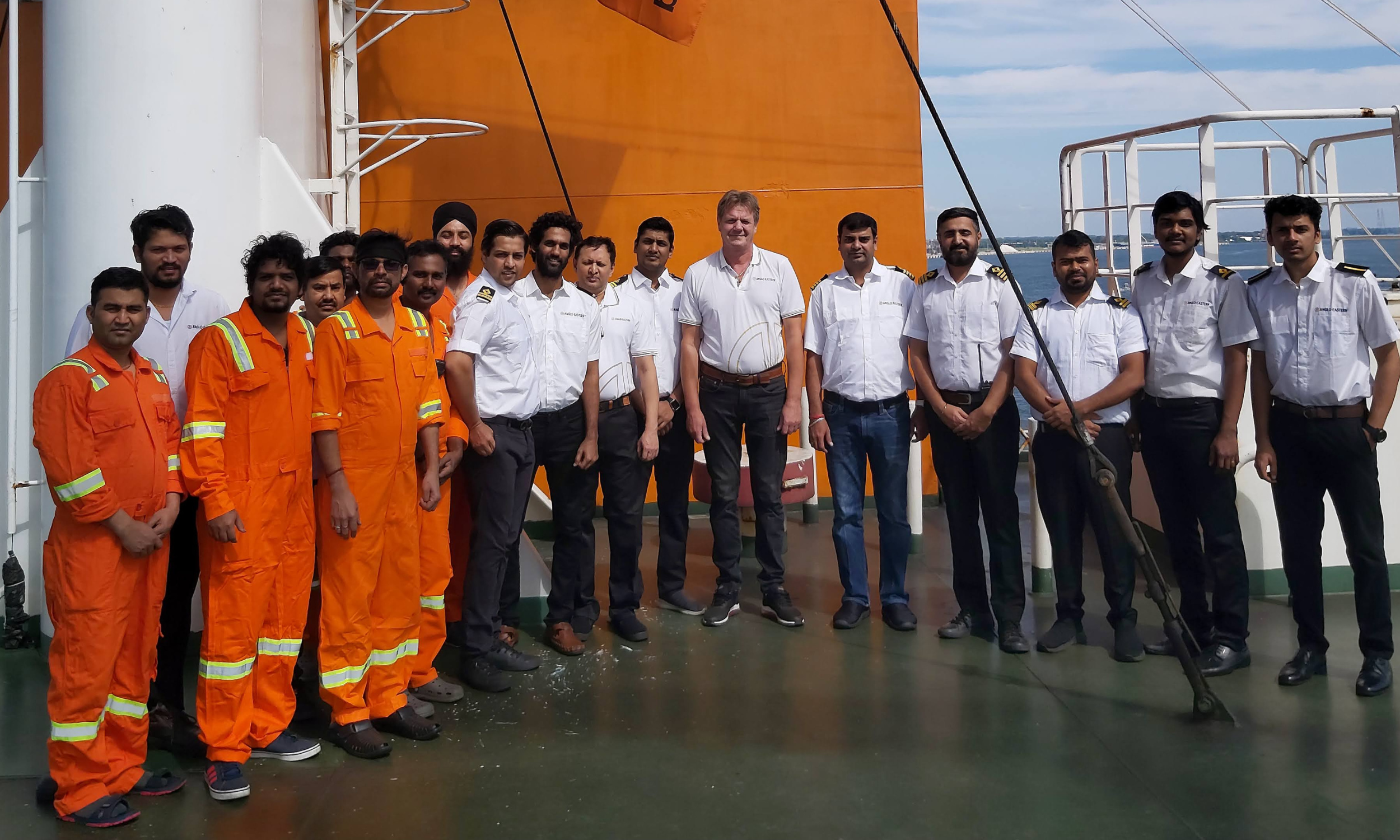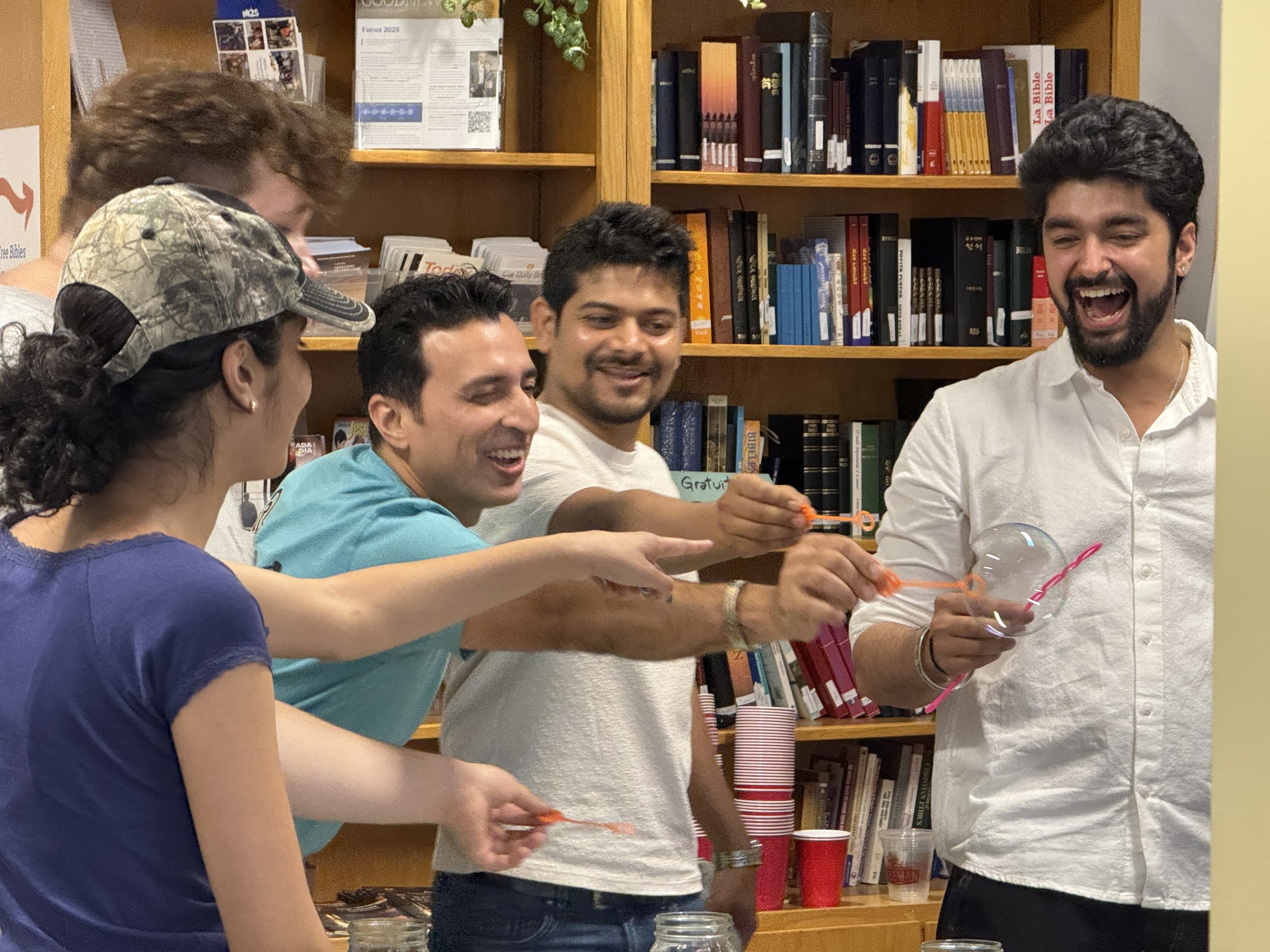
GOODNews | Celebrating 60 Years
From The Ministry to Seafarers
October 2025, No. 104
What is Christian Ministry?
by Nicolas Shone, Summer Intern
Christian ministry...is it a spiritual and materialist service to our community, an organized liturgical act, or is it simply being present to those who may or may not be in need?
As a young Christian layman discerning clerical ordination, these questions have been on my mind quite a lot. I’ve always wanted to serve and help people, but I never quite knew how or where I could go to accomplish this desire of mine. Fortunately, through the Montreal Mission Internship I was able to get in touch with the Ministry to Seafarers (M2S), a Christian chaplaincy organization working in the port of Montreal, ministering to the spiritual and material needs of one of the most invisible groups of people in the world; seafarers.
Throughout my two months with M2S, I got to work alongside two wonderful chaplains, David and Michelle who taught me so much in terms of chaplaincy as a practical job and the work it entails, but also as a vocation, and the spiritual nature of the work being performed. Initially I was totally out of my comfort zone, with moments of silence dominating some days and extreme busyness occupying others, not knowing what to do or where to go, especially on huge ships with so many levels and different rooms! Having to speak with people who I didn’t necessarily share a common language or culture with was also difficult, yet I learned so much about the seafarers and where they come from, and what their customs, norms and home countries were like by simply observing them and asking questions here and there.
I came to M2S with so many questions about life, work and the spiritual nature of the world we inhabit. I left with so many answers, yet even more questions than before. I greatly appreciated my time with M2S and will doubtlessly continue volunteering when I can in the future, because the mission of these chaplains truly calls to me.
Volunteers & Visitors
In the spring, a group of students taking a graphic design course from Judson University generously tithed their time to work on a few projects for us. Under the capable direction of Prof Laurie, Mia, Phoebe, Liz, Isabella, Elizabeth, Grace, Dimitri and Emma created beautiful multi-lingual Christmas parcel inserts, graphics for our Today for Seafarers blog content and a new template for our online newsletter. We had recognized our need for more help in this department and God providentially brought together this unique partnership which worked out beautifully for all parties.
Thanks to Sheila Margerrison, Ophélie Legars-Tousignant, Rob Whitley and the Montreal Mission Internship (MMI) cohort for volunteering their time to help with administration, ship visiting and Day of the Seafarer festivities.
The MMI students also painted exquisite Christmas Parcel bags which seafarers will be very happy to receive.
Events | Celebrating In Community
Wednesday, June 25 | Day of the Seafarer
Several MMI students joined in playing games with the seafarers. One mariner had never been to Montreal before and kept expressing how welcomed he felt being at the Centre.
Saturday, September 13 | Seaway Bike Tour Fundraiser
The 6th Annual Seaway Bike Tour Fundraiser took place on September 13, 2025. Forty-eight cyclists, including two virtual participants (Elmira, ON and Nanaimo, BC), rode more than 1,500 kilometers combined, raising over $40,600 for the well-being of seafarers. We were able to take full advantage of a generous $20,000 matching gift to attain our goal. At the end of the ride, participants were treated to an authentic Ukrainian lunch prepared by Sasha and Sasha Jr.
In our 60th year of ministry, this outpouring of participation and funding served as a confirmation that despite our funding challenges, we must carry on being present in the Port of Montreal for seafarers, reflecting the love of Jesus each and every day.
Upcoming Events
December 24, 2025, 5-9 pm | Free buffet and Christmas Eve service. Bring the whole family!
March 24, 2026, 11:30 am-1:30 pm | Cabane à sucre Fundraiser
September 12, 2026, 9 am-3 pm | 7th Annual Seaway Bike Tour Fundraiser
Christmas Parcel Campaign
For more than 40 years we have invited you to share your Christmas with a seafarer and you have always responded enthusiastically! Gifts are a tangible way to let seafarers know they are seen and valued. They are one more opportunity for us to connect with them.
What seafarers are saying:
“Thank you ministry to seafarers for giving this gift to us, crew much appreciated.”
Visit the Christmas Parcels page for all the details.
Strategic Planning Update from the Board
One ongoing conversation between the Board and staff has been setting strategic goals that flow out of our new Vision statement and revised Mission statement. Some goals are primarily the responsibility of the staff and others, primarily the responsibility of the board. For example, the Board is focused on the sustainability of the ministry and strengthening the relationship with Mariners’ House with whom we share our premises. The staff are taking the lead on goals around educating others about the work we do and encouraging the faith of seafarers. Examples of progress:
The board secured the $20,000 matching gift for the Seaway Bike Tour Fundraiser.
The staff have introduced 103 people to the work of the ministry through in-person and virtual tours. Most recently, we thank Thomas Hedley, Drs. John & Elizabeth Scott, Violet Cai and students from the Montreal School of Theology for their visits and interest in our work.
Financial Update
What would you like your legacy to be?
Did you know gifting your appreciated securities (shares or mutual funds) eliminates the capital gains tax liability while providing you with a full charitable tax receipt? Christian Stewardship Services can help you take steps to realize your stewardship goals.
You can donate by e-transfer (donations@ministrytoseafarers.org), through the PayPal Giving Fund, at CanadaHelps or by cheque. Visit our Donate webpage for details.
Better yet, you can get one charitable receipt for all your yearly donations by setting up an account with Christian Stewardship Services. Give to any Canadian charity. Give anytime. Top up your account as needed. Get one tax receipt from CSS for all your donations. Visit the CSS MemberNET website for details.
NOTE: As you consider your giving, please take the ongoing Canada Post tensions into consideration.
-
About GoodNews
GoodNews is our newsletter, published three times per year. Be a part of our community and stay informed about our work.
-
Staff
Chaplains
Michelle DePooter, Lead Chaplain
David Rozeboom, Chaplain
Administrator
Patricia Sarazen
-
Board of Directors
Shawn Brix, Chair
Vicki Vanderveen, Vice Chair & Staff Liaison
Evert de Boer, Secretary
Brian Vandenberg, Treasurer
Debby Smit, Volunteer Liaison
Arnold DePooter, Director

“Thank you for the Goodnews mailout - I love everything about the newsletter, the articles, the photos, the events calendar and the seafarer spotlight.”
— Sonja V.











